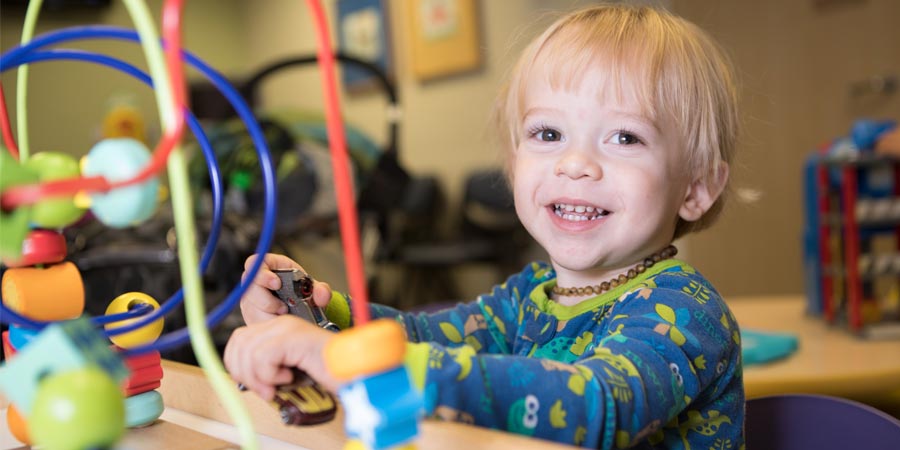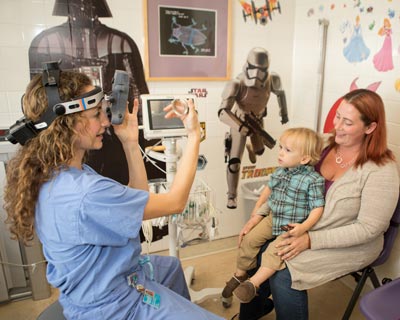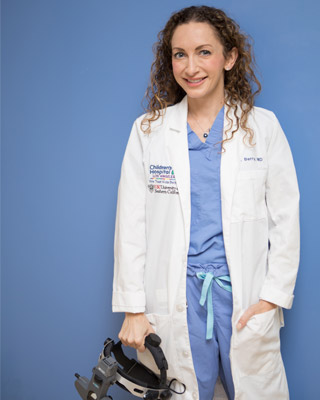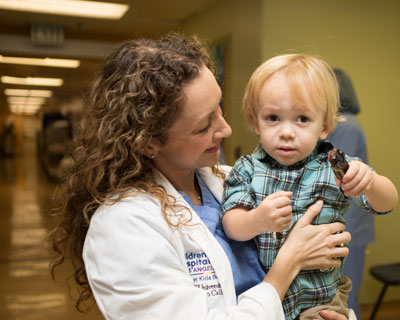
At 6 months old Cooper was diagnosed with retinoblastoma, cancer in the eye.
Never underestimate a mother’s intuition. Lisa Morris’ son Cooper was just 6 months old when she noticed his left eye looked unusual in photographs. There was a glint that gave him a slightly cat-eyed appearance. A week later, at his well-baby appointment she asked her family physician to take a closer look. He didn’t see anything concerning. Maybe it was nothing, but her intuition told her to remain on guard.
Two months later, she knew what she saw in his photographs was real. The glint now appeared as a white spot. Again, the well-baby exam turned up nothing. This time, she made an appointment with a cancer specialist, who quickly confirmed her worst fears. Cooper had a tumor, called a retinoblastoma, growing at the back of his eye. She was told to go home and pack a bag. He was to be treated with chemotherapy immediately. Again, mother’s intuition told her to put on the brakes. She wanted 24 hours to consider treatment options. Ultimately, Lisa decided to take Cooper to an ophthalmologist who would offer a better treatment; one that saved Cooper’s life and his vision.

Cooper with his mother and Dr. Berry during an eye examination.
Morris took Cooper to Jesse Berry, MD, an ophthalmologist who specializes in eye cancer and is part of the retinoblastoma team at Children's Hospital Los Angeles and USC Roski Eye Institute. Instead of subjecting Cooper’s entire body to toxic chemotherapy, Dr. Berry would use a more targeted approach that treats only the eye. “I wanted to give him the best quality of life after cancer,” Morris said.
The technique is known as intra-arterial chemotherapy. Physicians guide a thin tube from an artery in the thigh up to an artery in the eye to deliver the anti-cancer medication directly to the tumor. This approach is more effective than treating the entire body with chemotherapy. It also limits the adverse effects of chemotherapy, and it allows more kids to keep their eye and their vision.
“It’s a pretty scary procedure, but Cooper didn’t seem bothered by it,” Morris said. “He had no nausea after treatment, and the next day, he was up and about, doing his thing.”
New Treatment Offers Better Results

Jesse Berry, MD,
Though rare, retinoblastoma is the most common type of eye cancer in children. There are approximately 350 new cases diagnosed each year in the United States.
The disease primarily affects young children under age 5. It can be hereditary or non-hereditary, and can affect one or both eyes. Early diagnosis, when tumors are small, improves the child’s chance of survival, as well as keeping their vision and their eye.
Cooper had the non-hereditary type, and it was not caught early. Four months had passed since Lisa first caught sight of that ‘glint’ in a photograph. At 10 months old, Cooper was diagnosed with a large tumor in one eye. He would begin an intense treatment regimen that included three monthly treatments of intra-arterial chemotherapy.
Intra-arterial chemotherapy did a good initial job of treating Cooper’s tumor, but his case was advanced. Bits of the main tumor, called seeds, had broken off and were floating inside his eye. If any one of these seeds fell onto his retina, they could create more tumors. Seeding in the vitreous, the clear gel that fills the eye, is one of the primary reasons for tumor recurrences after chemotherapy for retinoblastoma. Many children have had their eye removed due to new retinoblastoma tumors. “It’s like a war zone,” Dr. Berry explained. “You have to kill off all of these seeds.”
Discovery May Lead to Better Treatment
Dr. Berry made an exciting discovery as she treated kids like Cooper. As she performed intra-vitreal chemotherapy, she removed a small amount of aqueous humor which is the clear fluid filling the space in the front of the eyeball between the lens and the cornea. This enables her to safely inject the anti-cancer drug. Instead of discarding the aqueous, she took a closer look in the lab, and discovered that there is enough DNA swimming in the sample that she could perform genetic analyses of the tumor while the eye is actively undergoing treatment.
Previously, physicians would only get this kind of information (tumor DNA) if the eye were removed as treatment for the cancer. Dr. Berry’s discovery may allow physicians an opportunity to better target care for children with retinoblastoma based on what the tumor DNA shows. “It’s still early in our research, but it’s really exciting. It has the potential to significantly help these kids,” she said.
Learn more
Dr. Berry was ready to battle the seeds with a new, and even more targeted therapy, called intravitreal chemotherapy in which the anti-cancer drug is injected directly into the eye. A recent clinical study demonstrated that this treatment is 100 percent effective in killing vitreous seeds. To date, none of the 36 patients who received this therapy had to be treated with radiation or had their eye removed due to seeding. Cooper had three weekly treatments of intravitreal chemotherapy.
“Previously, the main cause for relapse in patients with retinoblastoma was seeding because they are very difficult to treat,” Dr. Berry said. “What intravitreal chemotherapy has allowed us to do is astonishing. It has allowed us to save eyes, and avoid external beam radiation therapy, which has all sorts of secondary side effects, including a risk of inducing other cancers. It’s really an exciting new treatment.”
Nineteen Months Old and Cancer-free

Dr. Berry holding Cooper in the hospital hallway.
Surprisingly, after all Cooper has been through, he continues to be courageous as he makes his frequent journeys from his home in San Diego to Children's Hospital. “It’s like he’s going to see his extended family,” Morris said. “He has his favorite nurses and Dr. Berry is great with kids.”
Dr. Berry is also great with parents, especially those who’ve done their research. “I can ask Dr. Berry anything,” Morris said. “She gives me the whole picture, so I can make an informed choice. She’s a good person, she’s honest.”
Cooper is now 19-months old. The tumor appears to have affected his side vision, but it hasn’t slowed him down a bit. He’s fearless, as he keeps up with his 4-year-old brother. He’s cancer-free, he still has his eye, and he can see, thanks to a ground-breaking treatment and his mom’s intuition.